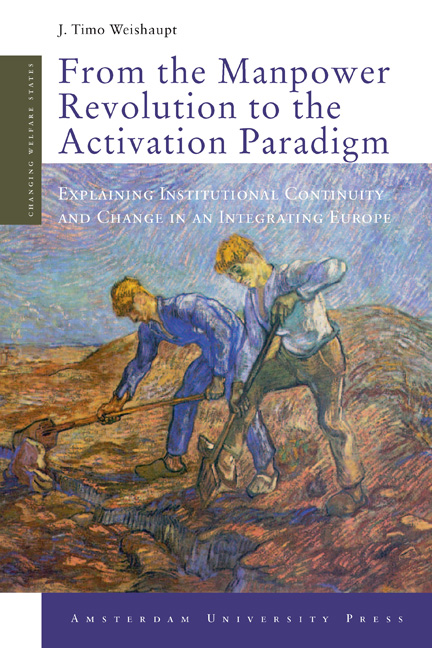 From the Manpower Revolution to the Activation Paradigm
From the Manpower Revolution to the Activation Paradigm Book contents
- Frontmatter
- Contents
- List of Boxes, Figures and Tables
- Abbreviations
- Acknowledgements
- I Introduction
- II Theoretical Approach
- Part I Origin and Crisis of European Labour Market Policy Regimes
- Part II The Emergence of the Activation Paradigm
- List of Interviews and Personal Conversations
- Notes
- Bibliography
- Index
- Changing Welfare States
- Frontmatter
- Contents
- List of Boxes, Figures and Tables
- Abbreviations
- Acknowledgements
- I Introduction
- II Theoretical Approach
- Part I Origin and Crisis of European Labour Market Policy Regimes
- Part II The Emergence of the Activation Paradigm
- List of Interviews and Personal Conversations
- Notes
- Bibliography
- Index
- Changing Welfare States
Summary
In concluding this book, I would like to revisit the three central questions posed in the introduction, including:
1) Do national labour market policy reform eff orts exhibit covariation across Western Europe, and if so, how and why?
(2) What impact, if any, have the recommendations of international organisations such as the OECD and the EU had on national reform agendas?
(3) Have recent reform activities, in the context of the OECD Jobs Study and the EES, fundamentally transformed the historic composition of national labour market policy regimes, and if so, to what effect?
Given the rapid developments associated with the economic and financial crisis that has haunted the global economy since 2008, a fourth section reflects on government responses to the crisis and closes with an interpretation of the long-term consequences of the crisis on the “activation paradigm”.
Do National Labour Market Policy Reform Eff orts Exhibit Covariation across Western Europe, and if so, How and Why?
The principal theme in this book has been my claim that transformative institutional changes follow actors’ reassessments about existing institutions’ capacity to tackle problem situations. This book has thus offered a new “lens” to better understand the origins and evolution of contemporary labour market policy regimes by focusing on changes in predominant worldviews, i.e., the causal and normative ideas about the causes of, and remedies for, high levels and, often, persistent unemployment and inactivity. Tracing how new ideas evolve and spread – often through the active proliferation of the OECD and the EU – and how these ideas have (not) been interpreted, internalised and implemented, has been the focus of this book. I have argued that it is precisely the acceptance or rejection of new ideas that has allowed – or prevented – the emergence of new actor constellations and coalitions, which are critical in stimulating the processes of institutional convergence, divergence and hybridisation.
The manpower paradigm that originated in Sweden during the 1940s and 1950s triggered a phase of labour market policy convergence during the 1960s in most parts of Western Europe. Policymakers shared the view that full (male) employment could be reached and sustained through interventionist macro-economic and industrial policy.
- Type
- Chapter
- Information
- From the Manpower Revolution to the Activation ParadigmExplaining Institutional Continuity and Change in an Integrating Europe, pp. 295 - 314Publisher: Amsterdam University PressPrint publication year: 2012


